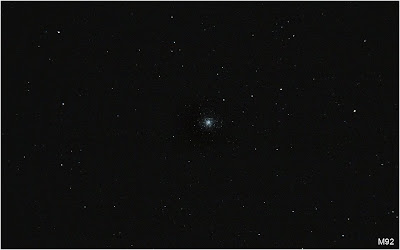This round, two things were different:
- I spent the time ensuring I had a better alignment. It took a great deal longer, but the results blew away my first shoddy attempts at taking pictures with this gear. Instead of doing a simple two-star alignment with an additional calibration star, I did a two-star with several calibration stars AND I performed Celestron's All-Star Polar Alignment routine.
Assuming the All-Star routine really works (which is evidently does), it's really amazing how far off my mount was in pointing to the north celestial pole. I don't have a polar axis scope, and given other amateur astronomers feedback on the All-Star routine it looks like I may not really need it!
On a good night, the alignment routine will take me 15 minutes. This is a far cry from the 45min+ needed for a good drift alignment. I also assume it's not as accurate as a carefully applied drift alignment. Regardless, the All-Star routine gave me one minute exposures with virtually no trailing. Maybe I was just lucky! - I bought a bahtinov mask from Farpoint Astro. This took all the guesswork out of focusing and as far as I'm concerned, is a cheap no-brainer accessory to add to your imaging toolkit. I couldn't imagine focusing without it. I first tried to make my own, but I eventually decided that $18 bought me a piece of equipment vastly superior to what I could make.
The Easy Target
M92, a globular cluster in Hercules is nice and bright in the eyepiece. You can easily see it in a short exposure and is therefore easy to locate and center. You don't have to spend hours imaging and processing to discover that your target is being clipped accidentally.
 |
| M92 - Globular cluster in Hercules. 4 x 30" |
The alignment is definitely better, with little to no trailing. However, evidence of coma clearly shows around the edges of the image. Darn newt. Well, maybe when I get better at this I can look into a coma corrector.
The Hard Target (for me)
Caldwell 34 -- the Veil Nebula in Cygnus -- is a DSO I can't see from my home with my telescopes, although I have seen it in my 10" newt at a dark(er) site.
I only took one sub of the Western Veil (30 seconds at ISO800) and at first glance I could see nothing...
 |
| C34 - Veil Nebula in Cygnus |
... but it's there! This was my first face-to-face with a DSO that would need more subs, a longer exposure and heavier processing to draw out the details.
Here's a Photoshopped version of the same image to help draw out the nebula:

No comments:
Post a Comment